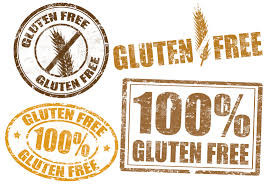
You’ve Tried Gluten-Free But Are Still Suffering
As much as we want to villainize gluten and blame all our issues on this pesky protein, there are many underlying issues that contribute to your health woes that set the stage for gluten’s potential damaging effects. These poor health effects can impact far more than just your belly. Gluten intolerance can affect the thyroid, brain, pancreas, hormones, joints, and pretty much any function in the body.
In your intestines, your inner tube, there are tiny gaps called tight junctions. These tight junctions have a role of keeping a balance of water, nutrients, and electrolytes within the gut tube and surrounding blood circulation. These tight junctions also regulate the trafficking of environmental antigens across these tiny channels. An antigen is something potentially attacked by your immune system. Antigens could be bacteria and virus but also chemicals, pollens, pet dander, etc.
A tiny little protein, called Zonulin, is the main signaling component to regulate the opening and closing of these tight junctions. The body doesn’t make or do stupid stuff. Zonulin is essential for you to digest and absorb nutrients. The delicate balance is that when nutrients are present, the gates can open. When a bacteria is present, the gates should close. If a bacteria or virus has gotten this far, it has already by passed other defenses like your skin, your respiratory system, and is now coming down the gut associated lymph tissue pipe line.
Your gut is lined with a mucous membrane that has a role of defending you without you knowing. This gut lining favors an anti-inflammatory environment. Imagine if you felt EVERY little attack against EVERY little antigen that our bodies face every day. We would never get any sleep, you would never make it to work, and our bodies would be so drained, that this would be the instant end to professional sports as we know it.
Your body isn’t stupid. It knows exactly what to do when we provide it with what it requires and avoid what is harmful. Your symptoms is just your body’s way of telling you there is a problem and buying you enough time to create a solution.
Z-Z-Z-Zonulin.
The problem with tight junctions is that 2 of the most powerful zonulin stimulating substances are gluten and small intestine containing bacteria. You may know the later as SIBO (small intestinal bacterial overgrowth).
 How gluten can wreck your health is by stimulating the effects of zonulin repeatedly. In other words, you keep the channels open between your insides and outsides. Just think of what’s coming down that inner tube you call the gut. You’re in the process of making feces to be released into porcelain Johnny. That waste material now has the potential to leak out into your blood stream.
How gluten can wreck your health is by stimulating the effects of zonulin repeatedly. In other words, you keep the channels open between your insides and outsides. Just think of what’s coming down that inner tube you call the gut. You’re in the process of making feces to be released into porcelain Johnny. That waste material now has the potential to leak out into your blood stream.
Even though it is comprised of foods you ate, even organic and raw, the body doesn’t like a dirty body. The clean up crew, aka your immune system, engages to clean up the mess. Your immune system will engage both inflammatory factors as well as antibodies to get the job done. Short term, it’s pretty efficient. But when there is long term exposure, now you have repeated chronic immune attacks, which keeps you chronically inflamed as well as keeps sounding the emergency antibody alarm.
Those antibodies smarten up and go on the offense, potentially attacking anything that may remotely resemble the waste it just cleaned up. Since there’s nothing in the human body that can’t be found on our planet, it’s not hard to pick on organs and systems that have similar resemblance. You’ve heard comedians joke that white people think all Asians look the same? It’s kind of the same concept inside your body. This is the basis of auto-immune disease.
The other major problem is that with the tight junctions not regulated well, you don’t absorb and assimilate nutrients well. Nutrient deficiency then creates more issues as your systems and organs aren’t getting the basic building blocks to maintain function.
As a result, you’re both toxic and deficient. No wonder you feel like crap.
What do you do? One day, you’re complaining about your health woes to a friend or a co-worker and they suggest that you should go, ‘gluten free.’ It’s pretty convincing. Since your friend went gluten free, they feel fantastic, have dropped weight, got a promotion at work, married a super model, and their 401k got a 200% return the past year when everyone else’s dropped 30%. Why not give it a try?
You start your gluten free journey but you’re not having the life changing effects that your homie has had. What gives?
When Gluten Free Gets Glitched Up
The main problem I see with people that just remove gluten and expect Jesus to return is that they are treating the gluten free experience like a changing a light bulb. You changed the light bulb, why doesn’t the light turn on? 99% of the time, a new light bulb fixes your lighting problem.
But going gluten free is more like a hurricane. The hurricane is over but there’s often a massive rebuilding process involved, a state of emergency has been declared, and people are rushing from all over the nation to help out.
Your nervous system organizes and coordinates zonulin release. In the presence of high zonulin stimulating molecules, those tight junctions can remain open longer. The more this happens, this becomes the default pathway for the gut lining. Even though you removed a major insult, the nervous system has be re-trained to chill out and relax.
As the tight junctions loosen, more material leaks into the surrounding system, keeping the immune system on alert constantly. A major branch of the immune system is inflammation. Inflammation is a powerful promoter of the sympathetic side of the autonomic nervous system. In other words, repeated inflammation is like facing repeated angry momma bear after angry momma bear.
As your nervous system starts defaulting into fight or flight, this will shift your body away from repair and into survival. When you’re running away from bears to survive, one of the last things on your mind is to fight bacteria and virus. You still have skin to protect you from the major attacks. Your respiratory system is more concerned about inhaling enough oxygen for the blood than to stop and sneeze. Lastly, your gut-associated lymph tissue has no chance since it’s already compromised from the chronic zonulin stimulation.
If that immune system is down, this allows for the colonization of non-beneficial bacteria to find a cozy home in your small intestine. Earlier, I mentioned gluten and small intestine containing bacteria are 2 powerful stimulators of zonulin. Sure, you removed gluten but there’s a possibility you have SIBO (Small Intestinal Bacterial Overgrowth).
Another major issue I see that thwarts people in their gluten-free journey is that they just replace gluten with other substances. I’ve even had people confess to eating worse when going gluten free because they were just picking up anything and everything that said, ‘gluten-free.’ They admitted to eating ice cream, brownies, cookies, and chips; things they weren’t eating while not concerned about gluten.
Many of those other gluten free containing packages do contain longer chemical lists, longer artificial ingredient lists, and other grains that though they may be gluten free, look similar enough to gluten that the body starts the attack process all over again. Foods that may mimic and cross react are things like casein (the main protein in milk), whey, oats, corn, and rice.
The Take Home Message
When you aren’t getting the results you hoped for when going gluten free, you need to address these other potential issues. Need more specific help? You know how to find me.
- Autonomic Imbalance. Your nervous system is flooring the gas pedal with no intent of tapping the brakes for recovery.
- Chronic Inflammation. Just because the hurricane is gone, doesn’t mean your house is still standing. You need to repair too, not just avoid hurricanes.
- SIBO. Small Intestinal Bacterial Overgrowth has similar zonulin effects in the gut as gluten does.
- Cross Reactivity. Assess foods that the body may trigger a ‘just in case’ immune response. Many times these foods are also nutrient poor and therefore continue to add fuel to the fire of poor recovery through deficiency and toxicity.
Zonulin, regulation of tight junctions, and autoimmune diseases


For me a gluten free died was a great problem, but somehow I have managed to get used to it.